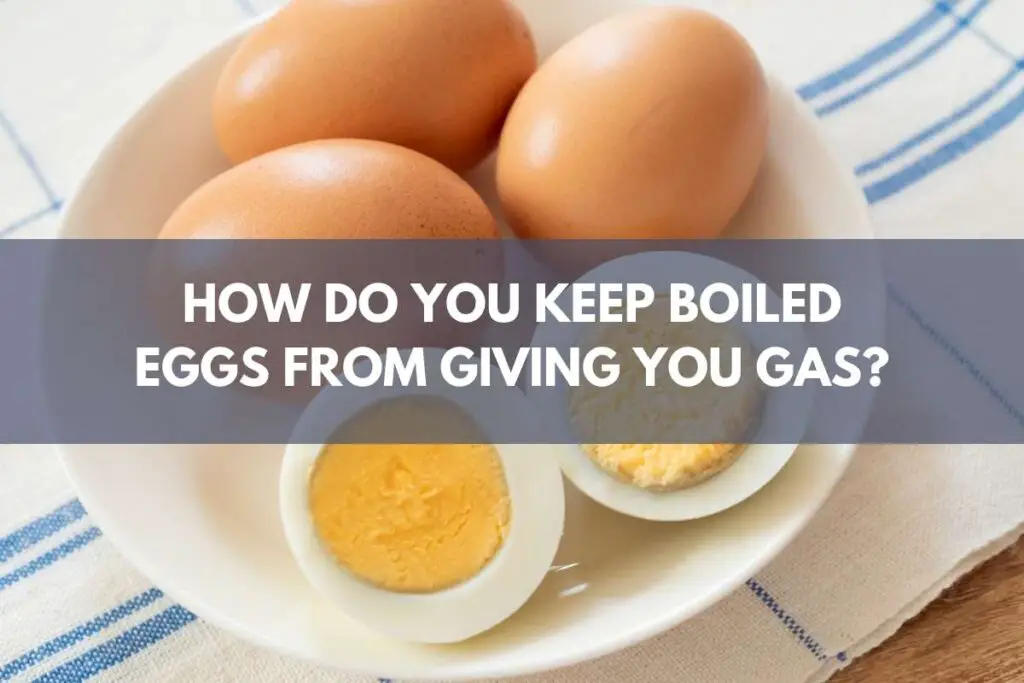There are a few things you can do to keep boiled eggs from giving you gas. First, make sure you are using fresh eggs. Older eggs are more likely to cause gas. Second, be careful not to overcook the eggs.
Overcooked eggs can also cause gas. Finally, avoid eating egg yolks. The yolks are the most likely part of the egg to cause gas.
You can do a few things to keep boiled eggs from giving you gas. Make sure not to overcook the eggs.
Avoid eating egg yolks, as they are typical gas-producing food. Finally, drink plenty of fluids throughout the day to help keep your digestive system moving.

If you’re prone to gas after eating boiled eggs, you can do a few things to minimize the chances of it happening. Be sure to fully cook the eggs so that they’re not runny.
Avoid adding any extras to the water when boiling, such as vinegar, as this can also lead to gas. Try eating smaller amounts of boiled eggs at a time, and pair them with other gas-safe foods like fruits and vegetables.
Contents
How Do You Hard Boil Eggs Without Making Them Smell?
To hard boil eggs without making them smell, you will need to use a water bath. Fill a large pot or saucepan with water and bring it to a boil. Carefully add the eggs and return the water to a boil.
Place the eggs in a pan filled with enough water to cover the eggs by two inches. Bring the water to a boil over high heat and immediately turn off the heat.
Cover the pan and let the eggs sit for 10 minutes. Turn off the heat and let the eggs cool to room temperature before peeling them.
How Do You Make Boiled Eggs Not Stick to the Shell?
One way to prevent eggs from sticking to the shell is to prick them into several places with a fork before boiling. Another way is to use an egg slicer.
To make the shell-less sticky, dip the eggs in a bowl with two tablespoons of vinegar, one tablespoon of sugar, and one teaspoon of salt. After you’ve removed the eggs from the hot water, you can add the yolk so that it doesn’t stick to the shell.
Boiling eggs is a good way to get them out of the shell; however, if you make the egg too hot, they can stick to the shell and be challenging to peel.
When boiling eggs, bring the water temperature up to 180 degrees F, then remove the eggs from the heat as soon as they are just barely cooked. If you leave them in the water for too long, they can become tough and rubbery.
How Do You Make Boiled Eggs Not Rubbery?
The easiest way to make boiled eggs not rubbery is to use a double boiler. Bring water to a boil in a small saucepan. Place a metal bowl over the saucepan, making sure that the bowl does not touch the water. Put eggs in the bowl and turn off the heat.
The most effective way to make boiled eggs not rubbery is to store them in the refrigerator after boiling them. Store them in the refrigerator and eat within a week or so.
When boiling eggs, make sure the water is boiling fast enough so that the heat is strong enough to break down the egg whites. If the water is too hot or slow, the whites won’t cook as fast, and the yolks may overcook and get rubbery.
How Do You Make Boiled Eggs Not Green Around the Yolk?
To make boiled eggs not green around the yolk, you can place the eggs in a pot of cold water for about 10 minutes before boiling them. Alternatively, you can place the eggs in a bowl of ice water for about 10 minutes before boiling them.
After boiling eggs for 10 minutes, remove them from the heat immediately to avoid greening around the yolk. In addition, you may also be able to achieve this result by adding a few drops of lemon juice to the egg whites before cooking.
Moreover, to prevent the yolk from turning green, add a pinch of black pepper and salt to the water while boiling the eggs. This will keep the egg whites curdling and the yolks turning green.
How Do You Make Boiled Eggs Not Taste like Sulphur?
There are a few ways to make boiled eggs not taste like sulfur. One way is to use a fresh egg instead of a boiled egg. Another way is to use a water-only boil instead of a regular boil.
In a medium saucepan, bring water to a boil. While water comes to a full boil, crack eggs individually in a small bowl. Transfer eggs to a saucepan and cover with a lid. Let eggs cook in the covered saucepan for precisely 9 minutes. Remove the eggs and cool in cold water for about 5 minutes: peel eggs and slice in half.
Conclusion
You can do a few things to keep boiled eggs from giving you gas. One is to make sure they are cooked all the way through. Another is to avoid eating egg yolks, as they are common gas-causing food. Finally, you can try taking a digestive enzyme supplement before eating boiled eggs.
